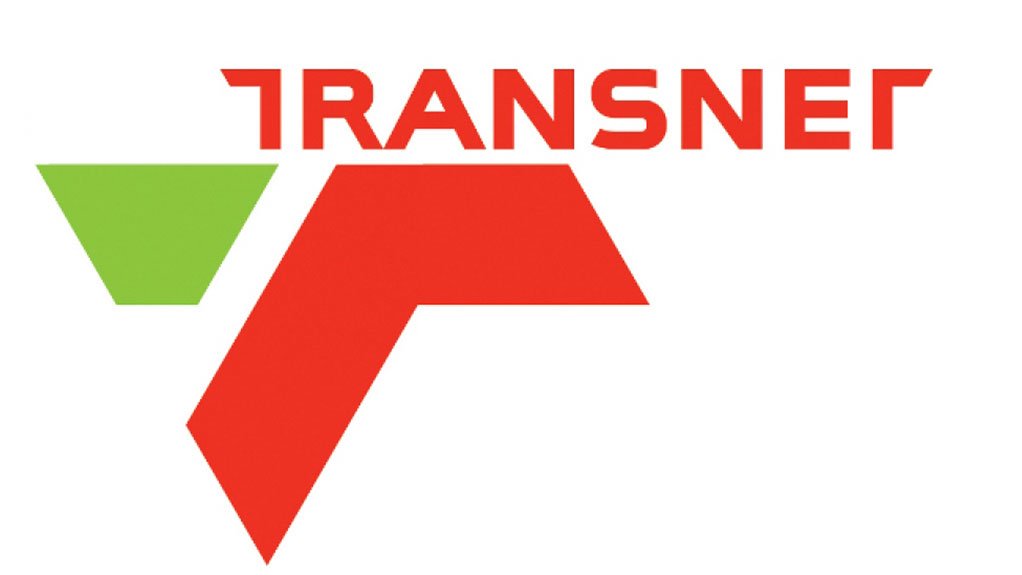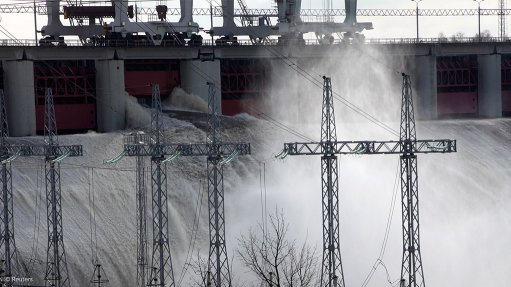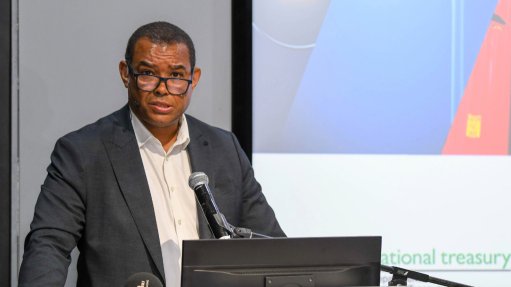Transnet delivers solid results in the year ending 31 March 2020, despite challenging operational environment
This article has been supplied.
Performance highlights
- Revenue increased by 1,3% to R75.1 billion
- Operating costs increased by 1,9% to R41,1 billion, R4,7 billion below planned costs
- EBITDA increased by 0,7% to R34,0 billion
- Net profit for the year decreased by 34,9% to R3,9 billion
- Cash generated from operations increased by 2,1% to R35, 9 billion
- Capital investment of R18,6 billion represents a 3,5% increase from the prior year
- DIFR performance of 0,73, the tenth consecutive year that this ratio is below 0,75 (the global benchmark is 1,0)
- Gearing of 47,6% and cash interest cover at 2,9 times, both within loan covenant requirements
Revenue and volume performance
Transnet reported an increase of 1,3% to R75,1 billion in revenue, supported by the weighted average tariff increase of 2,9%. The revenue increase was offset by a decline of 1,3% in rail freight volumes to 212,4 million tons, and a volume decrease of 2,4% in port container throughput to 4,4 million twenty-foot equivalent units (TEUs)), compared to the prior year.
The decline in rail freight volumes was mainly due to deteriorating economic conditions and low demand in many market segments, particularly in the construction and manufacturing industries. Rail volumes were further affected by poor operational performance because of power supply challenges and poor rail network conditions on certain key corridors due to maintenance backlogs, increased security incidents and adverse weather patterns.
The container throughput performance was impacted by operational challenges owing to ageing equipment in a number of port terminals across the port network as well as inclement weather.
Transnet Port Terminals (TPT) has invested R2,5 billion in the period under review for the acquisition and maintenance of port equipment. It is anticipated that that the deployment of the new port equipment will result in operational improvements.
Transnet’s net operating costs increased by 1,9% to R41,1 billion, with personnel and energy costs increasing by 1,7% and 4,8% respectively. Numerous cost-optimisation initiatives implemented throughout the company aided cost-containment, resulting in a R4,7 billion saving against planned costs. These initiatives included rationalising overtime, reducing professional and consulting fees; rolling out programmes to measure the execution of condition-assessment versus time-based maintenance; and limiting discretionary costs relating to travel, printing, stationery and telecommunications.
Financial position and funding perspective
As at 31 March 2020, the company’s cash-generated from operations increased by 2,1% to
R35,9 billion. A well-defined funding strategy enabled Transnet to raise funding of R10,4 billion (excluding the impact of lease liabilities and deferred interest) through the issuance of bonds and commercial paper (under the Domestic Medium-Term Note (DMTN) programme), and the execution of bilateral loans without the provision of Government guarantees. The funding needs until the end of calendar year 2021 are largely catered for.
Transnet’s gearing ratio increased to 47,6%, but is still within Transnet’s target range of less than 50% and within the triggers in loan covenants. Transnet recorded R4,3 billion in total cash and cash equivalents at the end of the financial year and a cash interest cover of 2,9 times which is within loan covenant requirements.
Capital investment
Capital investment for 2019/20 increased by 3,5% to R18,6 billion. A total of R3,6 billion was spent on capacity expansion, while R15,0 billion was spent to maintain capacity. Transnet Freight Rail and Transnet Engineering continued their build programme, with a total of 400 wagons manufactured and delivered, representing an investment of R528 million for the financial year.
Other infrastructure investment highlights for the financial year include:
- R3,0 billion invested in rail infrastructure
- R6,8 billion invested to maintain the condition of rolling stock
- R501 million invested in the wagon fleet renewal and modernisation programme
- R788 million for the construction of the new tippler in Saldanha and all the related bulk electric power supply
- R489 million invested in the manganese project mainly for the acquisition of land from Coega Developmental Corporation
- R303 million invested towards the upgrade of yards, lines and electrical equipment under the coal line investment programmes
- R187 million invested in the roads, port entrance and other services for the Tank farm in the Port of Nqgura
- Approximately R2,5 billion invested in the acquisition and maintenance of port equipment and infrastructure, including cranes, helicopters, tugs, dredgers and straddle carries; and
- A R333 million investment in the pipeline networks.
Group Executive Leadership
The 2019/20 financial year saw a number of leadership changes at Transnet. The organisation is starting to stabilise following key leadership appointments, driven by the Board of Directors and the Shareholder Minister.
These appointees bring an impressive and diverse range of skills, coupled with a wealth of experience and knowledge to help steer Transnet’s business operations.
Regulatory context and collaboration with law enforcement agencies
Transnet as a State-Owned Company (SOC) is governed by the Companies Act, the standard regulations that underpin governance and compliance for all South African businesses, as well as a distinctive set of regulations – unique to SOC – foremost being the Public Finance Management Act, 1999 (PFMA) of South Africa.
At its core, the PFMA drives fair and equitable dealings between South African public institutions and their stakeholders, which manifests as a broad directive for transparency, accountability and sound financial management.
Transnet has intensified its collaboration with law enforcement agencies and relevant regulators to expedite and bring to a close its review and set aside applications in respect of transactions emanating from State Capture, these include the 1 064 locomotive transaction. In addition, certain property transactions have also been referred to the Special Investigations Unit (SIU) for further investigation.
In pursuit of an ethical culture, measures to ensure effective consequence management, recovery of losses and credible procurement and transaction platforms are being introduced. A total of 408 members of the senior leadership team and the board underwent a lifestyle audit. We had 96% compliance, and 31,8% staff have material concerns that are currently under investigation.
Irregular expenditure
In the 2019/20 financial year, Transnet incurred irregular expenditure of R9,965 billion. The legacy of non-compliant procurement events continues to have a lingering effect on the business. In particular, past procurement practices that were not in accordance with the Preferential Procurement Framework, dating back as far as the 2011/12 financial year, resulted in a significant increase in reported irregular expenditure. In prior years there was exemption to certain clauses of the PPPFA on all Schedule 2 and Schedule 3B enterprises. The cumulative irregular expenditure including the 2019/20 year amounts to R114,3 billion, confirming the challenges facing the company to arrest the PFMA non-compliance.
Efforts to improve PFMA compliance resulted in 4% of the total Irregular expenditure of R9,965 billion arising from contracts entered into in the current financial year, a significant improvement. The process to identify and accurately report all irregular expenditure is largely manual in nature and continues to result in reporting inaccuracies. The resultant concern relating to the completeness of the reported irregular expenditure has resulted in the external auditors issuing a qualified opinion for the 2019/20 year.
It is important to emphasise that the financial statements are compliant with the International Financial Reporting Standards (IFRS). The qualification has mainly been as a result of non-compliance with the PFMA in the supply chain management processes and Transnet internal processes. The qualification has no bearing on the financial strength and sustainability of Transnet, as depicted in the annual financial statements.
Immediate steps taken
The responsible stewardship of public funds, full compliance with the PFMA and other legislative instruments, as well as holding management accountable for the implementation of effective internal controls and managing fraud and compliance risks are a key focus area of the new executive leadership.
In order to clear up all outstanding matters raised by the auditors relating to completeness and accuracy of information, our governance structures, integrated assurance and lines of defence are being strengthened.
Immediate corrective actions to address the quantum of irregular expenditure entail the review of previous remedial plans to close gaps and address the backlog in its implementation, as well as identifying sustainable solutions to address present and historic challenges.
This includes the complete overhaul of Transnet’s procurement and finance functions.
The procurement function – responsible for the bulk of the irregular expenditure incurred - has been separated from finance, and is led by the Chief Procurement Officer, reporting to the Chief Officer: Strategy & Planning. This has the advantage of ensuring better alignment between planning and procurement, improving efficiency in infrastructure delivery, amongst others.
Its reorganisation has commenced, and aims to address the shortcomings and challenges that led to PFMA non-compliance. This will allow for more accurate demand forecasting, and also ensure that Transnet’s sizeable procurement is delivered at the lowest cost, while stimulating economic growth – particularly amongst small and medium enterprises.
A review of the finance structure is underway. This function must undergo a thorough transformation if we are to ensure the financial health of the organisation. As a start, the appointment of a loss control function - reporting to the Group CFO - has been finalised, with the appointee starting on 1 November 2020.
The function will specifically deal with PFMA compliance, reporting as well as improving Transnet’s internal control environment. In addition, the loss control function will collect information on root causes that led to PFMA transgressions, employee(s) responsible for the irregular expenditure, losses suffered, and any breakdown in internal controls. It is from this base that we will be able to rebuild Transnet’s finance function into a modern unit.
In previous years Transnet’s internal audit function was fully outsourced. The organisation has now moved to implement a hybrid model, as part of strengthening the levels of assurance. In addition, from the financial year 2020/21, Transnet will be audited by the Auditor-General of South Africa, a move welcomed by the Company.
We are confident that the measures being taken across all governance structures will substantially improve compliance in general, and in particular with the PFMA.
We envisage that this process of reviewing and strengthening our governance and assurance structures will take us a while.
Corporate Social Investment
Transnet’s global flagship Phelophepa benefitted 105 565 patients through the clinics on the trains, while 357 323 individuals received services through targeted community outreach health campaigns.
Safety performance
Transnet’s leadership has heightened its oversight of safe operational performance through increased operational site-visits and safety awareness campaigns. It is regrettable that six employees were fatally injured during the 2019/2020 financial year. Unfortunately, 109 members of the public lost their lives in and around Transnet’s operations during the year.
These deaths were largely the result of railway crossing accidents, and we continue to look for ways to minimise incidents of this nature.
Outlook
The Company has performed below its potential in recent years, which has constrained its financial position. This is, amongst others, as a result of insufficient maintenance of ageing infrastructure and sluggish domestic and global economic growth.
The global economy is expected to remain subdued, with the impact of the Covid-19 pandemic resulting in slowing demand.
Economic forecasts indicate that the local economy will shrink by between 8.2% to 11.5% in the 2020 year, while the International Monetary Fund (IMF) forecasts that the global economy will shrink by at least 4.5% in the same period .[1]
Transnet faces significant challenges going forward, however, with a new strategic outlook, and a renewed emphasis on the wellbeing of People, Safety, Customer Service, Asset Utilisation, and Cost Control, the company is well positioned to become an agile and trustworthy freight transport and logistics partner to all our customers and stakeholders, and thereby contribute to the restoration of the South African economy.
[1] International Monetary Fund. (2020) https://www.imf.org/en/Publications/WEO/Issues/2020/09/30/world-economic-outlook-october-2020
Article Enquiry
Email Article
Save Article
Feedback
To advertise email advertising@creamermedia.co.za or click here
Comments
Press Office
Announcements
What's On
Subscribe to improve your user experience...
Option 1 (equivalent of R125 a month):
Receive a weekly copy of Creamer Media's Engineering News & Mining Weekly magazine
(print copy for those in South Africa and e-magazine for those outside of South Africa)
Receive daily email newsletters
Access to full search results
Access archive of magazine back copies
Access to Projects in Progress
Access to ONE Research Report of your choice in PDF format
Option 2 (equivalent of R375 a month):
All benefits from Option 1
PLUS
Access to Creamer Media's Research Channel Africa for ALL Research Reports, in PDF format, on various industrial and mining sectors
including Electricity; Water; Energy Transition; Hydrogen; Roads, Rail and Ports; Coal; Gold; Platinum; Battery Metals; etc.
Already a subscriber?
Forgotten your password?
Receive weekly copy of Creamer Media's Engineering News & Mining Weekly magazine (print copy for those in South Africa and e-magazine for those outside of South Africa)
➕
Recieve daily email newsletters
➕
Access to full search results
➕
Access archive of magazine back copies
➕
Access to Projects in Progress
➕
Access to ONE Research Report of your choice in PDF format
RESEARCH CHANNEL AFRICA
R4500 (equivalent of R375 a month)
SUBSCRIBEAll benefits from Option 1
➕
Access to Creamer Media's Research Channel Africa for ALL Research Reports on various industrial and mining sectors, in PDF format, including on:
Electricity
➕
Water
➕
Energy Transition
➕
Hydrogen
➕
Roads, Rail and Ports
➕
Coal
➕
Gold
➕
Platinum
➕
Battery Metals
➕
etc.
Receive all benefits from Option 1 or Option 2 delivered to numerous people at your company
➕
Multiple User names and Passwords for simultaneous log-ins
➕
Intranet integration access to all in your organisation





















